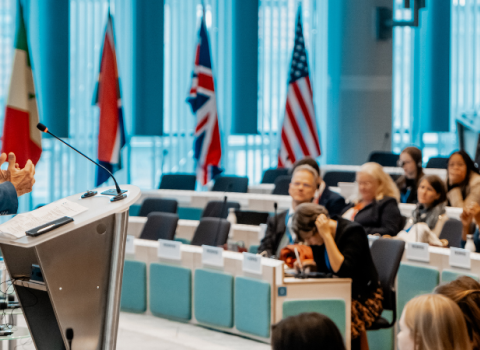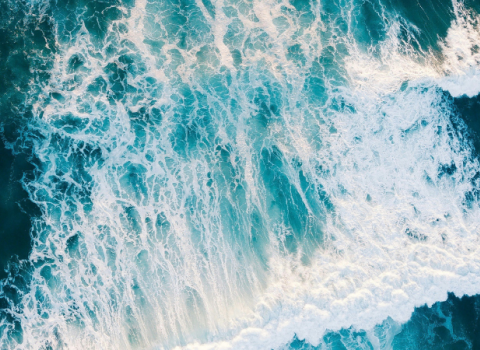Oceans, which cover 70% of the planet, are in peril. Global research is mobilising to study and rescue it, and the CNRS is on the front lines, with over 1,000 scientists and 50 laboratories involved. An overview of the actions underway and the major challenges ahead, from the coasts to the depths of the sea.
While a vision of oceans as indestructible has prevailed until the present, their current transformation–both visible and rapid–henceforth makes them a major preoccupation. The melting of continental ice and polar ice caps, the occurrence of extreme events, the emergence of a continent of plastic, and the exponential growth of human uses of the sea are so many indicators that illustrate this trauma and cause concern. “Oceans need science, all of the sciences. They are by essence an interdisciplinary topic, and a major factor in the durability of our planet. The CNRS encourages all ocean research in order to ensure their permanence,” affirms Antoine Petit, CNRS Chairman and CEO.
The CNRS, at the cutting-edge of ocean research
In the face of these established facts, the CNRS, with its exceptional interdisciplinarity in ocean science, is intensifying its mobilization with over 1,000 researchers across 50 laboratories. “It is quite simply one of the world’s leading research organizations on seas and oceans. A great treasure. Few countries have so many researchers working on the subject,” emphasizes Alain Schuhl, CNRS Chief Scientific Officer. For the CNRS has the means to study oceans in all of their dimensions–from molecules to global mechanics, from the depths to the atmosphere, from the coast to the high seas–in addition to their relations with professionals, users, the economy, and policy-makers. Major issues include their contributions to climate phenomena, the acquisition of new knowledge on how they function, the protection of ecosystems and biodiversity, the sustainable use of marine environments, and suitable governance.
Since 2018, the organization has had an Ocean Task Force bringing together its ten institutes. It disseminates information on research programmes and funding, and is designed to bolster the interface between scientists and decision makers, as well as to help create research programmes at the intersection of disciplines. “The Ocean Task Force intervenes on various scientific and strategic issues in which a shared CNRS vision and coordination between disciplines are necessary. It could involve building the integrated observation and modelling of the future, speaking with a single voice at national and international arenas of the science-policy interface, or contributing to policy programming,” explains Joachim Claudet, the CNRS Ocean Advisor. The co-management, with IFREMER, of the Ocean and Climate Priority Research Programme (PPR) since 2021, as well as the organization’s participation in major international bodies such as COP27, are so many examples of decisions made by the Task Force. “A distinctive feature–and a strength–of the CNRS is its interdisciplinarity, which we seek to coordinate as best as possible within the task force,” recounts Stéphanie Vermeersch, Deputy Scientific Director at the CNRS’s Institute for Humanities and Social Sciences (INSHS), and the institute’s representative on the Ocean Task Force. Today approximately one hundred HSS researchers are working on oceans. “They include geographers and economists on the land-sea interface, lawyers and political scientists on the status of the deep seabed, archaeologists who explore shipwrecks in the depths, and anthropologists and linguists connected to the populations and languages of insular territories threatened by rising waters. We are especially present in the OMER Research Group on Oceans and Seas,” adds Vermeersch.
OMER: Multidisciplinarity as paradigm
Launched in 2021 under the leadership of the CNRS’s Mission for Transversal and Interdisciplinary Initiatives (MITI) for a period of five years, the distinctive feature of the Omer GDR–initiated by the CNRS but bringing together scientists of all stripes–is its scope. “We made multidisciplinarity a paradigm. We approach oceans from the point of view of philosophy, climate, sociology, maritime law, biodiversity, signal processing for new sensors, and much more,” indicates Fabrizio dOrtenzio, the director of the Omer GDR. Today it includes over 1,300 collaborators ranging from scientists to industrial actors, journalists, and NGO staff members. Twelve working groups have been established so far, with others potentially blossoming. These groups, which are thoroughly multidisciplinary, focus on topics of major interest for the French marine science community. “Each working group includes scientists from all disciplines, from the most basic (chemistry, mathematics, etc.) to those focusing on the interaction between humans and their environment (philosophy, geography, sociology), in addition to environmental science (geology, oceanography) and the life sciences (ecology),” d’Ortenzio points out.
Three transversal research focuses in the process of being built will implement their research. They explore citizen participation, art and science, and support for public authorities. “What differences are there between current maritime research and the priorities of society? How to ask citizens to join us in this effort?” d’Oretnzio asks.
France, the world’s second largest exclusive marine area
The CNRS is helping address the challenges faced by oceans, and is also involved in the French government’s strategy, which is implemented via the French Ministry of Higher Education and Research (MESR), the Ministry of the Overseas, and the recent State Secretariat for the Sea (interministerial organization under the authority of the prime minister, tasked with coordinating government actions relating to the sea). For France has considerable impact on maritime research. With its 11 million m2—including 97 % located overseas, territories for which the CNRS is finalising a roadmap—the country is present in most of the world’s seas. France is the second domain in terms of exclusive marine economic zones, right behind the United States.
Under the leadership of MESR and the General Secretariat for Investment, the Ocean and Climate PPR will extend over a period of six years, with a budget of 40 million euors. Three areas presenting specific issues have been identified: overseas territories, deep seas, and polar oceans. Particular attention will also be paid to coastal spaces. The PPR is structured around major priorities such as forecasting the response of oceans to climate change and adaptation scenarios; the sustainable use of oceans, and the preservation of their biodiversity and ecosystem services; and the reduction of ocean pollution. “These three objectives directly address the dangers faced by oceans, with a view to providing concrete answers,” explains Catherine Jeandel, a CNRS researcher in marine geochemistry and the co-leader of the Ocean and Climate PPR, whose first call for proposals recently announced the first six winners.
The advantages of French research
To maintain France at the highest level of global competition, in 2021 the government launched the Priority Research Programmes and Equipments (PEPR), six of which (out of the 37 directed or co-directed by the CNRS) are connected to the study of oceans. Two examples are the Atlasea PEPR with the CEA, on the genome of 4,500 species in the French exclusive economic zone, and Solu-BioD with INRAE, which develops nature-based solutions in response to the environmental crisis, with one of its projects involving restoration and management of coastal biodiversity and ecosystem services. “These programmes will help develop thematically and geographically targeted research on oceans with the best partners, as well as tools and infrastructure on the national level,” indicates Claudet, who with IFREMER and the Research Institute for Development (IRD) is co-directing the Bridges PEPR on the sustainable management of marine resources in the southwest Indian Ocean, with a view to reducing the risks of conflict in the region.
The country also possesses the internationally envied French oceanographic Fleet (FOF), which is one Europe’s three largest alongside those of Germany and England, and the only one that can navigate in all oceans (along with Germany). Operated by IFREMER, it includes ships for the high seas, coastal ships, vessels used by stations (operated by the CNRS), in addition to submarine and sampling craft. Each year the fleet carries over 1,000 scientists, engineers, and technicians, and completes 40 missions using high-sea ships, 140 missions on coastal ships, and 300 on station vessels.
“The French oceanographic fleet is one of the best scientific tools in France. It must be preserved and consolidated at all costs. Alternatives exist, often coming from private initiatives, and they will be critical in broadening the scope of intervention for French teams in the future. However, this is always as a complement, and not as an alternative, to the fleet, as it is one of the reasons why our oceanographic research has a major impact throughout the world,” enthuses d’Ortenzio.
Directing knowledge toward the world of policy
The survival of oceans also depends on our ability to connect science with the policy world. This is why the CNRS is becoming increasingly involved in major global decision-making bodies, and is already one of the largest contributors of reports to the International Panel on Climate Change (IPCC). “The Covid-19 crisis served as a reminder of the crucial need to direct knowledge toward the policy arena. We must restore the role that science should have in society,” stresses Petit. And what could be better than taking advantage of the favourable landscape enjoyed by oceans?
The Decade of Ocean Science for Sustainable Development (2021-2030) initiated by the United Nations is notably tackling Sustainable Development Goal 14 (SDG14) from the 2030 Agenda, for the conservation of marine life. This is a global effort that involves scientists, policymakers, NGOs, and other stakeholders. “The Ocean Task Force is currently producing a strategic document drawing on the ten CNRS institutes on the topic of sustainability, which could inspire potential avenues for responding to the United Nations Decade, whose goal is to propose solutions for the challenges faced by oceans,” explains Claudet.
The Decade triggered a number of efforts, notably the Mission Board on Healthy Oceans, Seas, Coastal and Inland Waters (Starfish), one of the five missions of the new Horizon Europe (2021-2027) programme. Its goal is to regenerate European marine and freshwater ecosystems by 2030. “Some challenges identified by the Ocean PPR are also present in Mission Starfish 2030 or the United Nations Decade for the Oceanographic Sciences, and that’s normal. The scientific challenges are shared by the entire community,” points out Jeandel.
Putting oceans at the negotiating table
The CNRS was also present during COP27, as well as last March in Egypt in the form of a pavilion dedicated to oceans during the International Treaty of the High Seas (BBNJ), which was also initiated by the UN. “We were actively involved in the negotiations, and many of the positions advanced by France were adopted, especially in terms of identifying protected marine areas,” Claudet adds.
It is also within a future International Panel for Ocean Sustainability (IPOS)—which seeks to integrate scientific knowledge in the effort to model the evolution of oceans and sketch out actions for a sustainable ocean—that the CNRS is involved in the science-policy interface, alongside multiple international scientific partners such as the Woods Hole Oceanographic Institution in the United States and GEOMAR in Germany. “It is urgent that we organise the global scientific community in support of sustainable oceans. The CNRS has assumed its responsibility by working to jointly establish the operating principles and role of the scientific coalition within the IPOS. We will now actively participate in the coalition so that it can issue recommendations at the United Nations Ocean Conference in June 2025 in Nice,” specifies Schuhl. Meanwhile, the European Union has already integrated the IPOS within its ocean strategy. “The IPOS is the beginning of a major adventure for oceans and the role of knowledge in their future, especially in connection with the United Nations Sustainable Development Strategy and the United Nations Decade of Ocean Science for Sustainable Development,” underscores Françoise Gaill, CNRS Scientific Advisor and Vice President of the Ocean & Climate Platform, which was behind this proposal.
Who better to lead this and other projects than the CNRS, which has become a major actor in connection with oceans. “We know the important role that oceans play with respect to climate, and we hope that they will be on the negotiating table. Today scientists have reached a level of precise knowledge, and can suggest avenues for concrete action toward existing solutions for mitigation and adaptation,” concludes Petit.
This article was first published on 7 June by CNRS.





 A unique international forum for public research organisations and companies to connect their external engagement with strategic interests around their R&D system.
A unique international forum for public research organisations and companies to connect their external engagement with strategic interests around their R&D system.